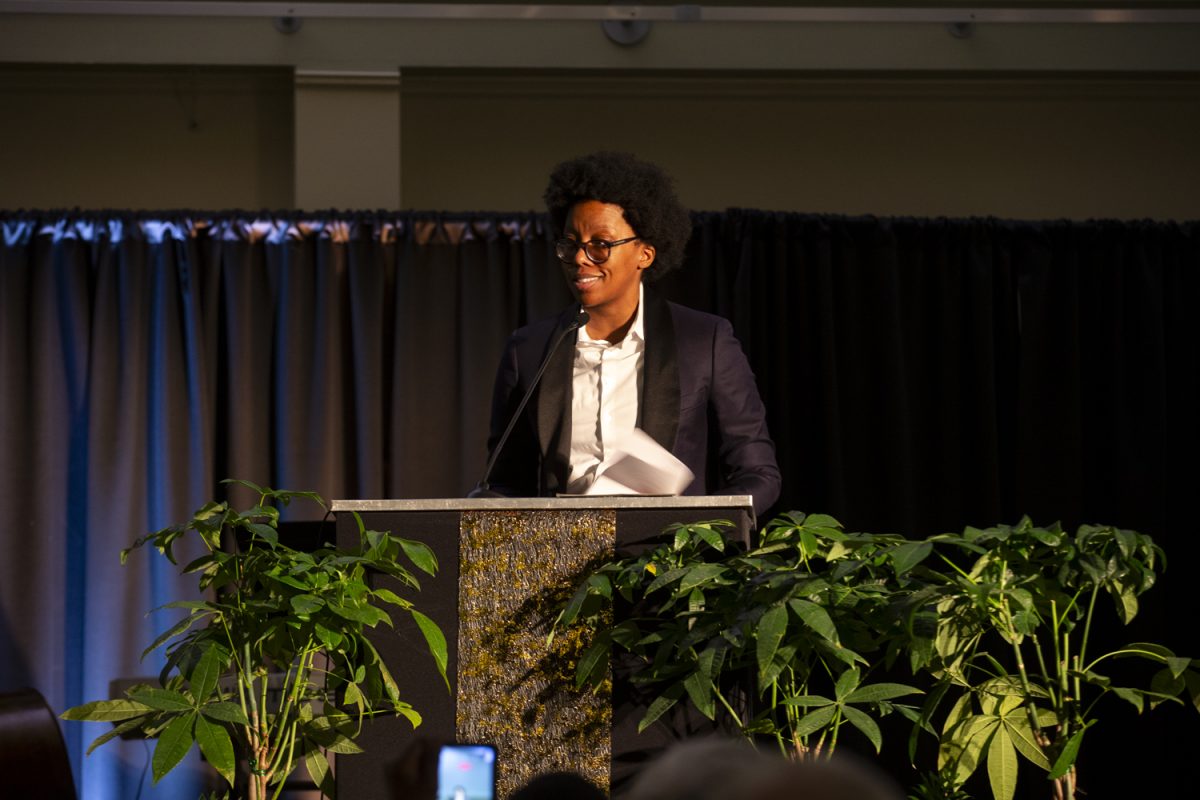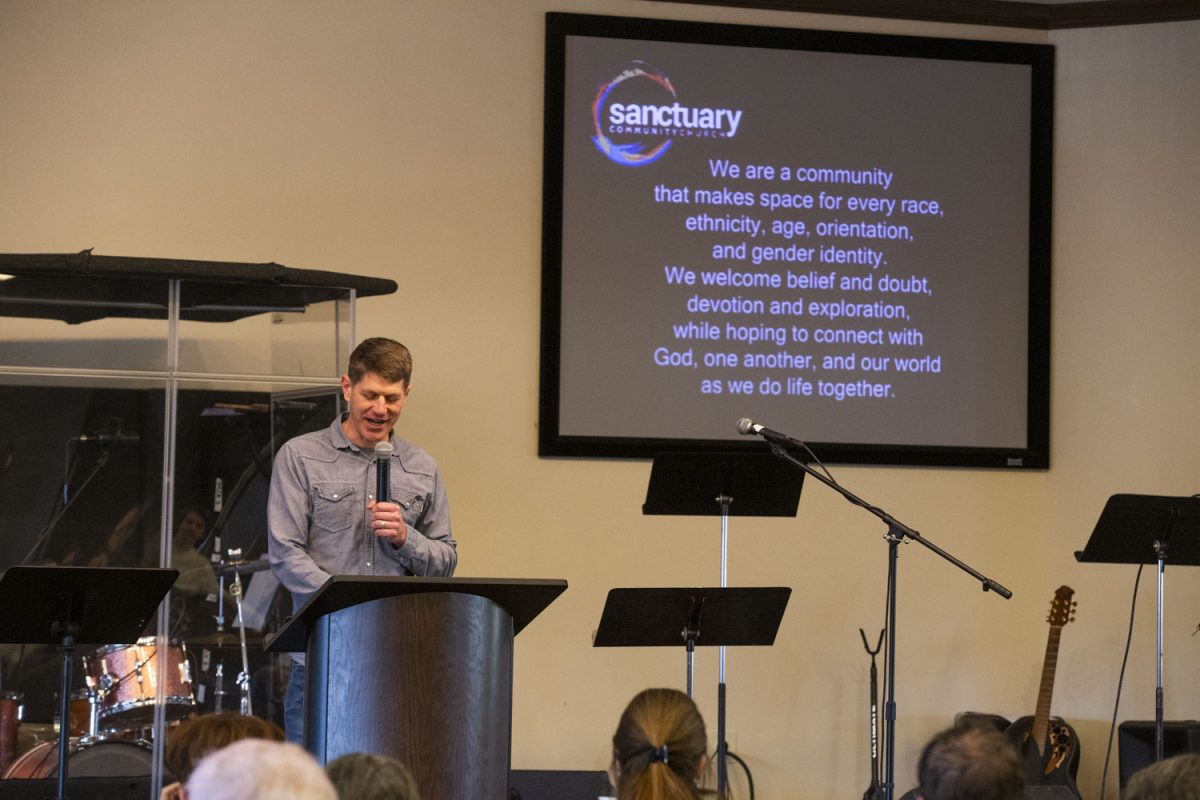Within the chiseled stone exterior of the Iowa City Senior Center was a scene of smooth jazz, elegant outfits, and the floating scents of fresh traditional cuisine the night of Feb. 4.
The senior center’s assembly room was packed during Iowa City’s first-ever Black History Ball — and event planners say it won’t be the last.
Ashley Howard, a University of Iowa assistant professor of African American Studies and History, was the keynote speaker at the event. Howard’s research includes topics such as the “Black Midwest” and the global history of racial violence.
“To see and to live in the world we want and deserve, to amplify our stories and our humanity, I want you to think about these questions,” Howard said during her speech. “What stories do you tell and circulate? And in the spirit of Sankofa, what stories do we need to go back and get.”
“Sankofa” is an African word originating from the Akan tribe in Ghana, meaning, “it is not taboo to fetch what is at risk of being left behind.” The word is also used in the name of the local nonprofit Sankofa Outreach Connection, which helped organize the event.
In Howard’s speech, she spoke of the impact of Black stories and what this ball means for the Black community, especially for the future. She emphasized how these stories deserve to be listened to and remembered.
“When I think of this ball next year, I’m also thinking about what are the stories that we will tell each other a year from now? What will we laugh about? What losses will we mourn? What achievements will we point to and say, ‘We built that. We did that,’” Howard said.
Attendees of the ball were outfitted with formal wear including suits and traditional dresses, some with beadwork and other ties to African cultures. No dancing took place at this ball, however.
Instead, participants found a place to sit and listen to the jazz band and the keynote speakers of the night.
The ball took five months of planning by several organizers including the senior center’s Original Mature Groovers, the UI Stanley Museum of Art, and Sankofa Outreach Connection, which works to retain and sustain women of color and their families in the Johnson County area.
The Original Mature Groovers, formerly known as the Elders of Color, is an Iowa City-based group that aims to provide a safe and welcoming space for people of color over the age of 50 to share their diverse perspectives and stories and foster new community connections.
LaTasha DeLoach, the senior center’s coordinator, said the event’s idea stemmed from the desire to bring the Black Iowan community together. The ball was also intended to help fund a trip for the Original Mature Groovers to learn more about the Underground Railroad, a secret network across the U.S. that formerly enslaved people used to escape their captors.
Proceeds from the ball’s ticket sales as well as a silent auction at the event will go toward the trip. According to DeLoach, the event raised $4,000 from ticket sales alone. DeLoach said an additional $400 to $500 was generated from the silent auction.
The formal nature of the event allowed community members to dress in formal wear as opposed to a more casual party setting.
Before the ball started, DeLoach watched people begin to gather and said the event was something the community was missing.
“This is a great way to honor those folks that are local, whether they are chefs or whether they’re musicians or other artists,” she said.
Wangui Gathua, an Iowa City Ad Hoc Truth and Reconciliation Commissioner, was also in attendance at the ball. The TRC is tasked with identifying systemic racism in Iowa City and providing recommendations to the city council.
Gathua said she saw the ball as an opportunity for the community to come together and was happy to see the senior center be a welcoming location for the community.
“I’m excited,” Gathua said. “It just provides more forums for people to get together.”
Gathua said events like these create more spaces for the community, particularly the Black community to get together. It’s something she hopes to see more of through her work at the TRC.
Along the walls of the center’s assembly room hung seven works of art made by Black artists, which were provided by the UI Stanley Art Museum’s collection.
Works of art included depictions of Martin Luther King Jr. from Ho Che Anderson’s graphic novels. Wood masks and sculptures from Nigeria and Sierra Leone were also displayed.
DeLoach said all 115 seats were taken by the Friday before the event and they could not accept any more people.
The Curtis Taylor Quartet, led by UI professor of jazz Curtis Taylor and composed of UI assistant professor William Menefield, bassist Jonathon Muir-Cotton, and drummer Alexander White, played jazz during the event.
The quartet’s jazz filled the ballroom as community members filled their plates with food. The night’s dishes originated from a variety of cultures in places like West Africa, Puerto Rico, and Jamaica.
Dishes available to attendees included jerk chicken, a traditional Jamaican dish that originates back to the Arawak and Taíno Indigenous peoples; jollof rice, a West African dish typically made with chilies, tomatoes, onions, spices, veggies, meat, and rice; and mofongo, a seasoned dish from Puerto Rico seasoned with mashed green plantains.
As event attendees settled into their seats, several speakers took the stage. Before the keynote speech by Howard, Pastor Bronis Perteit of New Life Apostolic Ministries gave an invocation and Iowa City Human Rights Commissioner Chair Roger Lusala shared a land acknowledgment.
Then, UI assistant professor of English Donika Kelly took the stage, and shared an original poem. Inspired by her family in southern Arkansas, the poem was titled “It’s gonna be what it is” and examined the experience of Black Americans.
Afterward, the audience stood for “The Black National Anthem,” also called “Lift Every Voice and Sing.” Taylor’s trumpet rang out, following the melody of the song as the crowd sang along.
Once finished, Howard took the stage delivering a 30-minute monologue on Black resilience, growth, and appreciation of Black culture. Howard spoke on stories from prominent Black figures including Malcom X, Aaron Douglas, Prince, and more.
“Our experiences matter and our stories are an integral part of the state’s history and its self conception,” Howard said during the speech. “The reimagining of their experiences must affirm Black Iowans’ humanity.”
Howard said there is reason to continue growing the community for Black Iowans while recognizing Iowa culture as a whole.
“We fight because we know that we are worth fighting for,” Howard said. “Black Iowans must embrace the complexity, beauty, horror, and promise that this state holds for people of African descent.”
Howard closed her speech with a wish for the continual growth of vibrance within the Black Iowan community as attendees gave Howard a standing ovation.
Attendee Simone Garza said she felt honored to attend the event and let people from the Black community come to share their culture.
“I feel pretty good to be here. Not about dressing up or looking pretty but also being able to represent our history. In our culture we are so strong,” Garza said.
Garza said she saw the ball as a “defining event,” and hopes to see more events like the Black History Ball take place around Iowa City.
“It’s a big milestone. I’m just glad that we’re able to make that change and continue to see more events like this.” Garza said. “We get to represent our heart, we get to represent our culture and our history.”
Editor’s note: Simone Garza is a former employee of The Daily Iowan. Additionally, a word in the story’s lede was changed to avoid negative connotation. The DI regrets this error.









